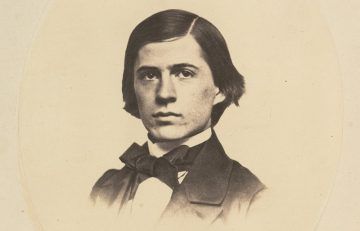Daniel Everett in Aeon:
[I intend] to make a philosophy like that of Aristotle, that is to say, to outline a theory so comprehensive that, for a long time to come, the entire work of human reason, in philosophy of every school and kind, in mathematics, in psychology, in physical science, in history, in sociology and in whatever other department there may be, shall appear as the filling up of its details.
C S Peirce, Collected Papers (1931-58)
 The roll of scientists born in the 19th century is as impressive as any century in history. Names such as Albert Einstein, Nikola Tesla, George Washington Carver, Alfred North Whitehead, Louis Agassiz, Benjamin Peirce, Leo Szilard, Edwin Hubble, Katharine Blodgett, Thomas Edison, Gerty Cori, Maria Mitchell, Annie Jump Cannon and Norbert Wiener created a legacy of knowledge and scientific method that fuels our modern lives. Which of these, though, was ‘the best’? Remarkably, in the brilliant light of these names, there was in fact a scientist who surpassed all others in sheer intellectual virtuosity. Charles Sanders Peirce (1839-1914), pronounced ‘purse’, was a solitary eccentric working in the town of Milford, Pennsylvania, isolated from any intellectual centre. Although many of his contemporaries shared the view that Peirce was a genius of historic proportions, he is little-known today. His current obscurity belies the prediction of the German mathematician Ernst Schröder, who said that Peirce’s ‘fame [will] shine like that of Leibniz or Aristotle into all the thousands of years to come’.
The roll of scientists born in the 19th century is as impressive as any century in history. Names such as Albert Einstein, Nikola Tesla, George Washington Carver, Alfred North Whitehead, Louis Agassiz, Benjamin Peirce, Leo Szilard, Edwin Hubble, Katharine Blodgett, Thomas Edison, Gerty Cori, Maria Mitchell, Annie Jump Cannon and Norbert Wiener created a legacy of knowledge and scientific method that fuels our modern lives. Which of these, though, was ‘the best’? Remarkably, in the brilliant light of these names, there was in fact a scientist who surpassed all others in sheer intellectual virtuosity. Charles Sanders Peirce (1839-1914), pronounced ‘purse’, was a solitary eccentric working in the town of Milford, Pennsylvania, isolated from any intellectual centre. Although many of his contemporaries shared the view that Peirce was a genius of historic proportions, he is little-known today. His current obscurity belies the prediction of the German mathematician Ernst Schröder, who said that Peirce’s ‘fame [will] shine like that of Leibniz or Aristotle into all the thousands of years to come’.
…The importance and range of Peirce’s contributions to science, mathematics and philosophy can be appreciated partially by recognising that many of the most important advances in philosophy and science over the past 150 years originated with Peirce: the development of mathematical logic (before and arguably better eventually than Gottlob Frege); the development of semiotics (before and arguably better than Ferdinand de Saussure); the philosophical school of pragmatism (before and arguably better than William James); the modern development of phenomenology (independently of and arguably superior to Edmund Husserl); and the invention of universal grammar with the property of recursion (before and arguably better than Noam Chomsky; though, for Peirce, universal grammar – a term he first used in 1865 – was the set of constraints on signs, with syntax playing a lesser role).
More here.
